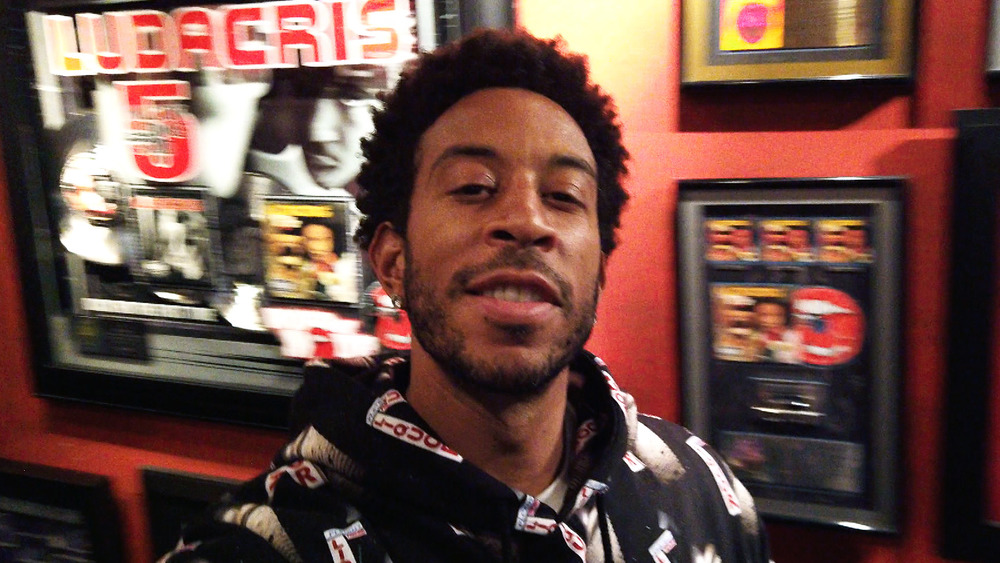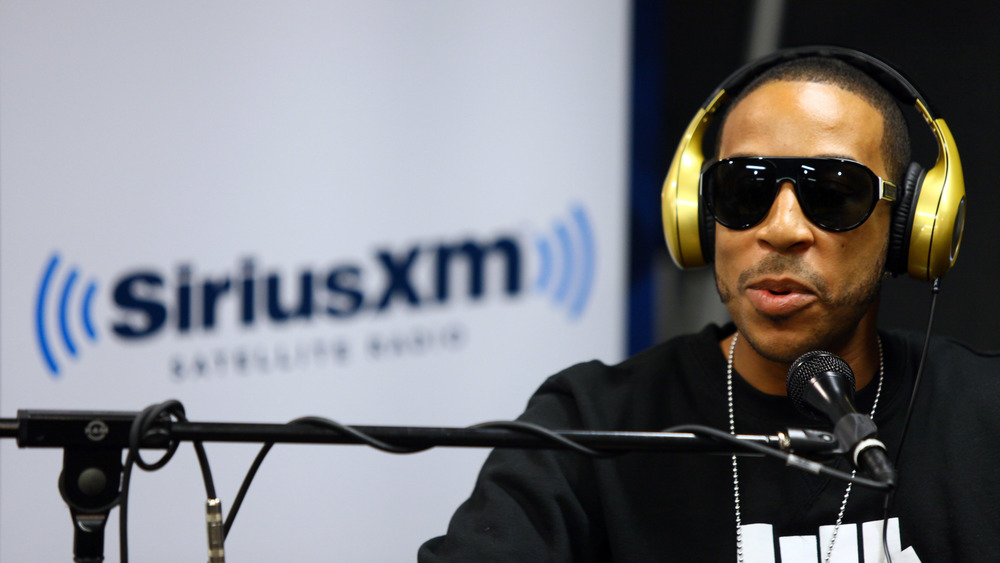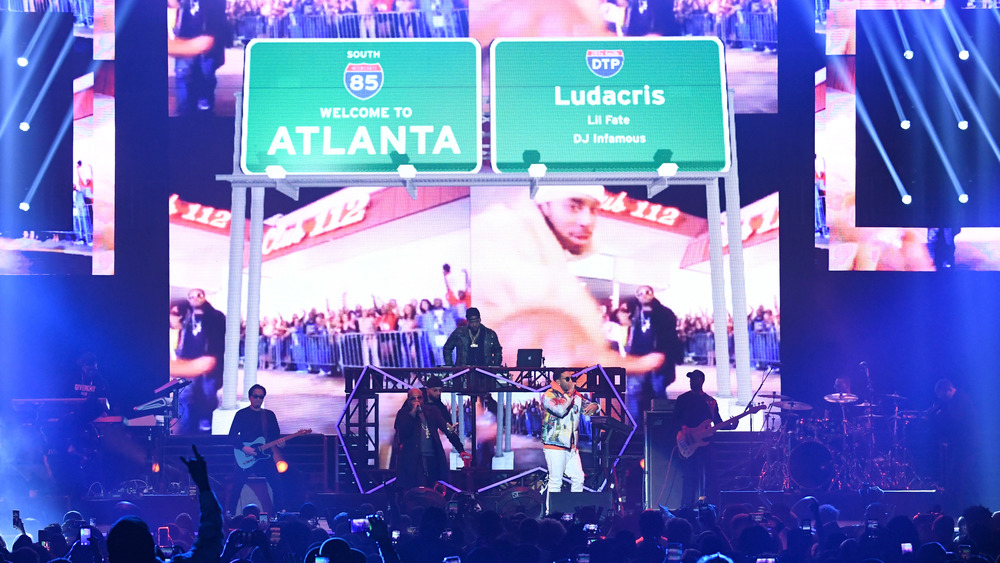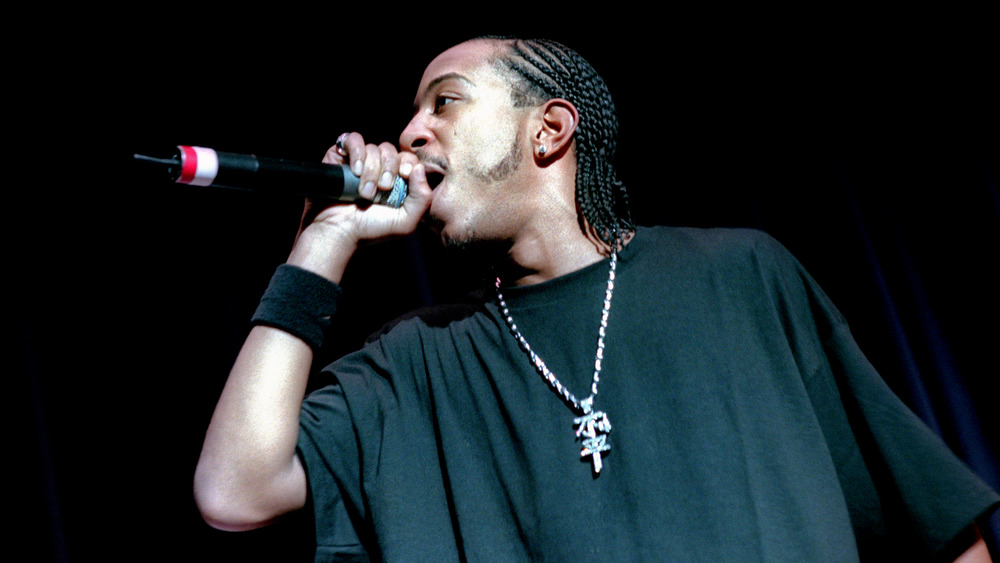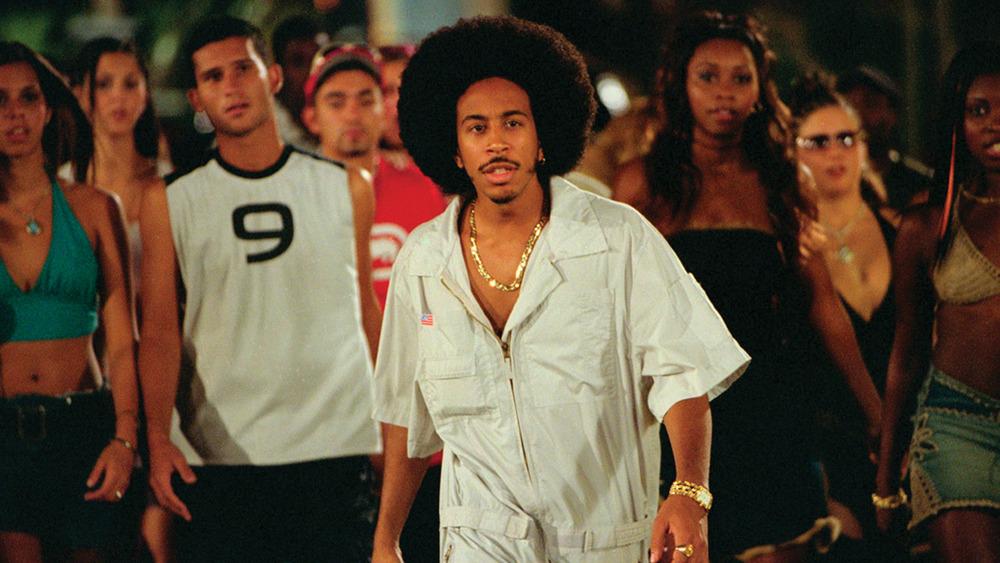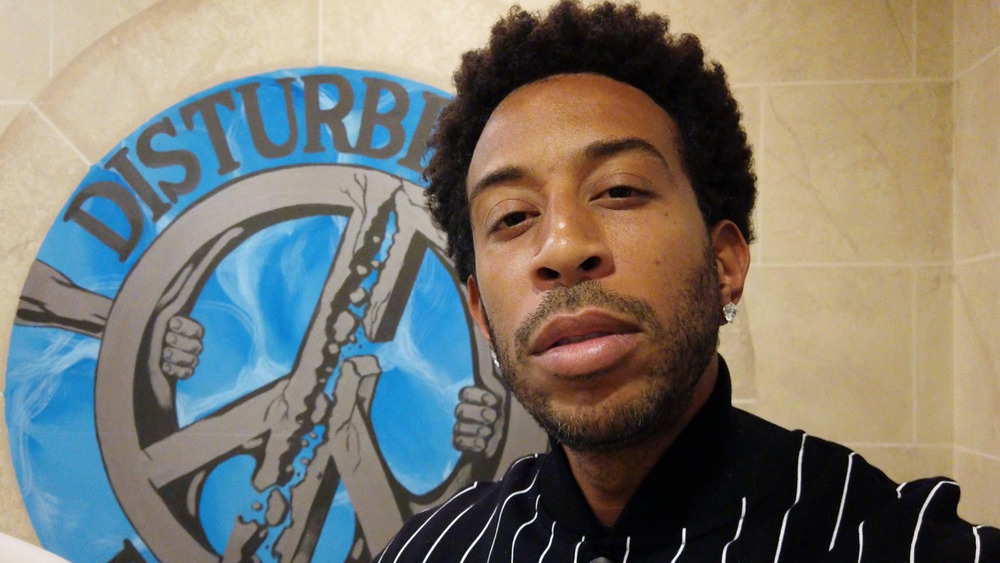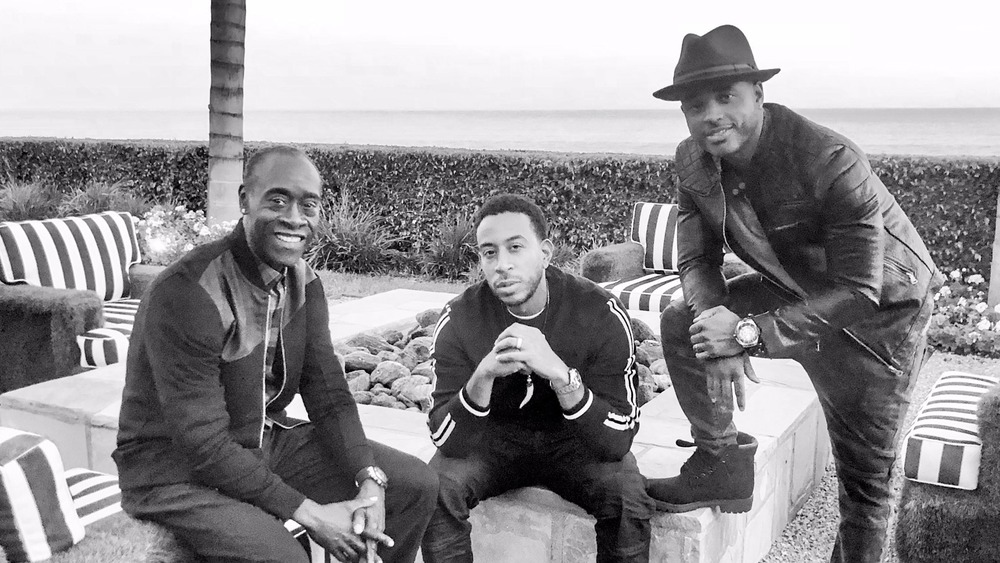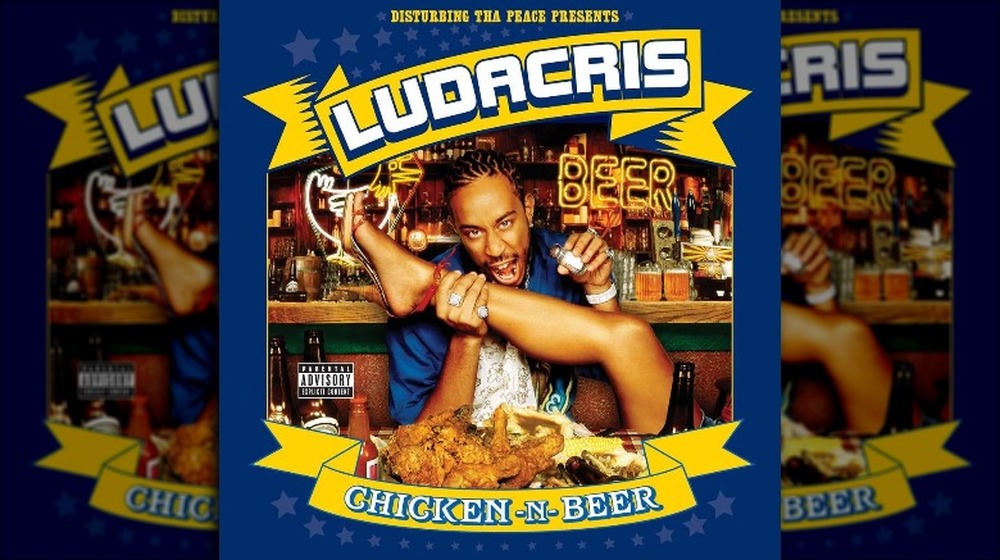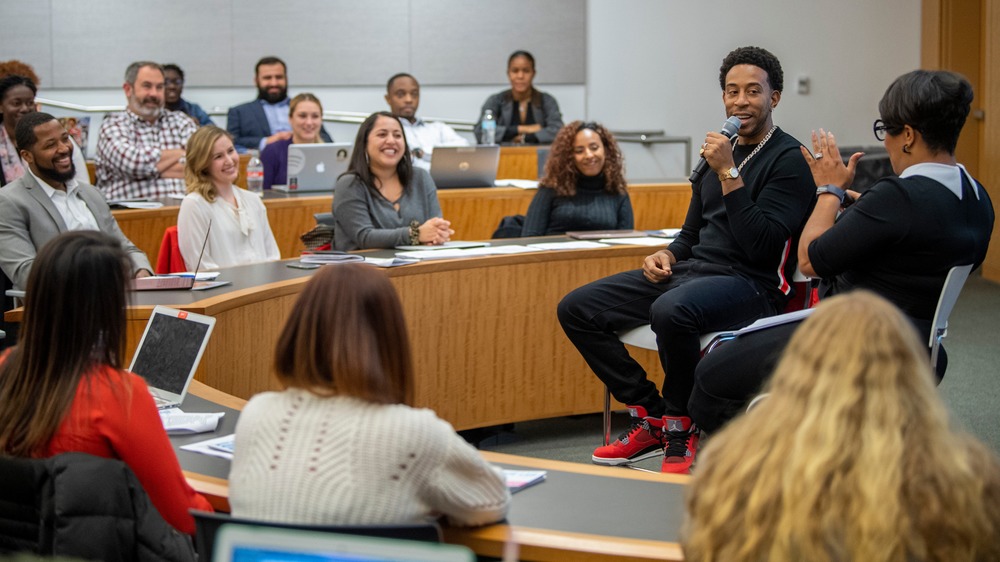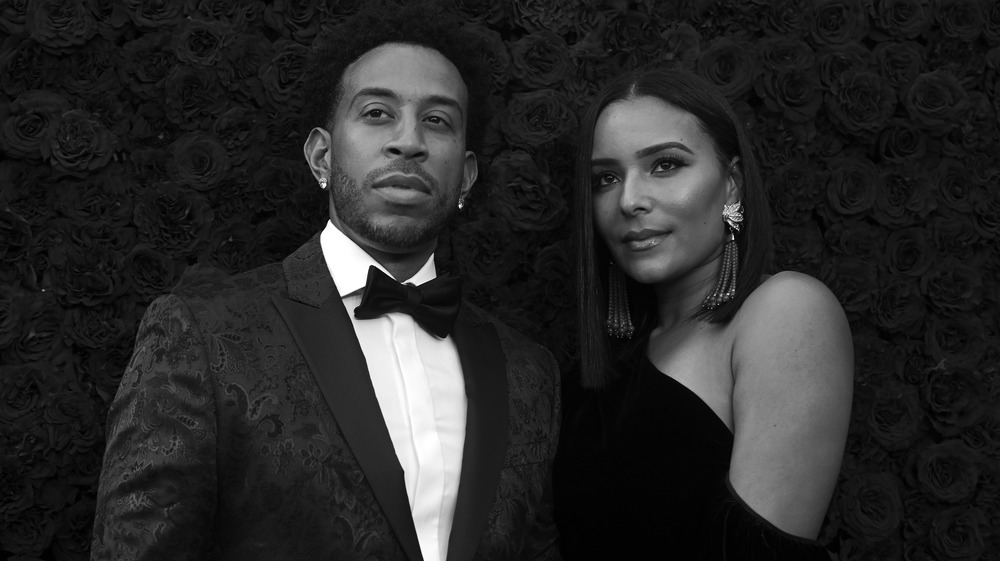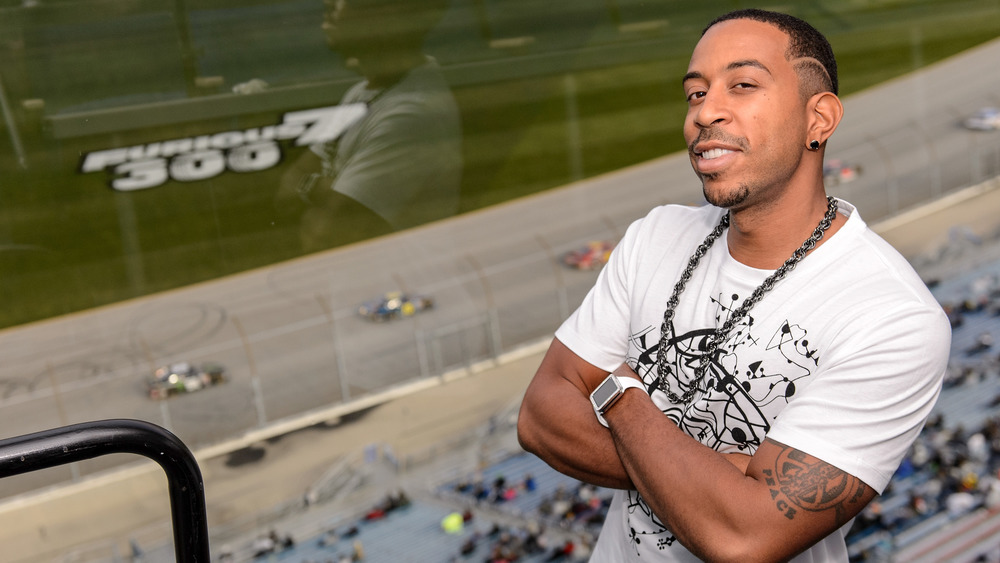The Untold Truth Of Ludacris
Best known for his contributions in some of the biggest chart-toppers and movies in popular culture, Ludacris is an icon with countless titles, from multi-platinum Grammy-winning artist and award-winning actor to entrepreneur and philanthropist. Riding the wave of the Dirty South movement to national fame, Ludacris has been entertaining the world since the late 1990s with his musical hits, film appearances, and more. Born Christopher Bridges, the artist was a man with a plan that always dreamed of making it big in music. Working hard from the beginning to build his career as a rapper, he strategically got jobs that would get him in contact with industry decision-makers and would sell copies of his music out of the trunk of his first car.
Over the years, his ambition saw no bounds, with the rapper venturing out to work on all sorts of projects, including starting his own non-profit organization to support and inspire urban youth and opening several restaurants in his hometown of Atlanta. While Ludacris may be one of the most recognizable names in entertainment today, there's still a lot more to be known about the multi-hyphenated music mogul. Here is the untold truth of Ludacris.
Ludacris used to be known as DJ Chris Lova Lova on Atlanta radio
Before his fame as Ludacris, Chris Bridges was making a name for himself as Chris Lova Lova on Atlanta radio. It all started during college, when Bridges landed an internship at Hot 97.5 (now Hot 107.9), the only hip-hop station in Atlanta at the time, according to B High and Hot 107.9. Working at a radio station was all a part of the aspiring rapper's plan, with Bridges explaining in a 2020 interview with The Mogul Mixtapes how being where industry insiders were was the perfect opportunity for him to get his own foot in the door. "...If I could become a permanent fixture at this radio station, you've got all these artists and all these producers that come through every single day. So, it's only a matter of time before somebody latches on, or at least I can get one of them to lend an ear to this music..."
Eventually, Bridges went from intern to on-air personality, making himself known as DJ Chris Lova Lova and would record rap promos for "every radio personality on the station," as described in an MTV interview. Soon, his time as Chris Lova Lova paid off, with the radio role helping him make some life-changing connections as record companies across Atlanta started paying attention, including figures like Jermaine Dupri, Dallas Austin, and LaFace Records.
The Atlanta rapper with Illinois roots
It's not hard to figure out that Ludacris is from Atlanta. Just a few listens to his songs and you can get a sense of how proud the rapper is of the Georgia city and the Dirty South. The first artist to be signed to Def Jam South, Ludacris became "arguably the most commercially successful Southern rapper of the time," according to iHeart Radio. But what was it that made him stand out so much among the Southern hip-hop scene and reach a national audience? It may have been the fact that he actually grew up in the north.
As Stereo Gum describes, Ludacris' early years were spent in Illinois, with the young aspiring rapper not moving to Atlanta until he was in high school. "That meant that Ludacris rapped without the gooey, marbled accent that made Southern rappers such a tough sell for so many East Coast listeners." His upbringing also influenced his writing style. While lyrical content at the time often referenced the darker aspects of street life, Ludacris tended to take a humorous approach to the "lighter" topics of sex, money, and partying. In an interview with The Mogul Mixtapes, he explained, "I think I brought a certain light to hip-hop, that wasn't necessarily always talking about having to shoot guns. You know, the street life is great ... a lot of people have gone through that, but it's also okay to smile and laugh and actually joke around."
Ludacris sold his debut album out of the trunk of his first car
When Ludacris put out his first album, Incognegro in 1999, he had no major label backing. Released independently on his own indie label, Disturbing tha Peace, the debut album sold 50,000 copies in the South through his own grassroots selling efforts, according to his interview with MTV. "When I put out Incognegro, it was a real struggle; I had to save up money to do everything, sell it out the trunk and get it in the stores." His car of choice lent itself to being handy for those promo efforts.
In a 2017 interview with a.list, he described how he saved up the money he earned from working at the radio station to make a down payment on a 1993 gold Acura Legend. "People would call it the drug dealer car. I had to have one of those cars because even though I wasn't dealing drugs, I was definitely dealing music out of the trunk!" Nearly two decades later, the rapper still never got rid of that iconic first car, even passing it down to his daughter to test drive.
Ludacris inadvertently has Ja Rule to thank for his 2 Fast 2 Furious role
When 2 Fast 2 Furious director John Singleton reached out to the rapper Ja Rule about his new role in the film, he didn't expect to be rejected. Ja Rule, who had a cameo in the original The Fast and the Furious, was now dismissing a lead role and half a million dollars in a move that would end up benefiting Ludacris big time. As Singleton described to MTV, "[Ja Rule] was acting like he was too big to be in the sequel...He was kinda playing me to the side and I was like, 'What? What is this sh-t?'...I then made a call. I called Ludacris."
Completely brand new to the acting scene, Ludacris took hold of the opportunity with an excited "Why not?" attitude, filming his audition "tape literally 10 minutes before [he] was about to go on stage" when he was on tour with Eminem, according to an interview with a.list. Before he knew it, he had landed the part as Tej Parker and has stayed a part of the massive franchise ever since.
How Ludacris cares
Talking to a.list, Ludacris described how, during his time as Chris Lova Lova at the Atlanta radio station Hot 97.5, it was a requirement for employees to put in hours towards community service each week. "At that age, I didn't truly understand why they were making us do it. But I really saw the impact I had on kids when I was just a local celebrity in Atlanta." Even as Ludacris started seeing massive success with his music and was becoming a national star, giving back to the youth and the community stayed at the top of his agenda.
Just a year after the release of his first major label album, 2000's Back for the First Time, the Atlanta rapper founded The Ludacris Foundation in 2001, according to the foundation's official website. With the mission of inspiring "urban youth to live their dreams and envision new possibilities," the foundation organizes programs and partnerships focused on the 3L's — Leadership and Education, LudaCares (community service), and Living Healthy Lifestyles, as described on the official website. Headed by Ludacris as the chairman and his mother, Roberta Shields, as the president, The Ludacris Foundation has partnered with organizations like Feeding America, Make-A-Wish Foundation, and Boys and Girls Clubs of America to give back to communities in the rapper's hometown of Atlanta and beyond.
Pepsi's hypocrisy led to a $3 million agreement with the Ludacris Foundation
When Ludacris partnered with Pepsi for a major television ad campaign in 2002, the goal was reportedly "to attract younger urban soda drinkers," as described by People. But soon, Bill O' Reilly, the former Fox News commentator with multiple sexual harassment lawsuits, called on his viewers to boycott Pepsi for working with someone who "degrades women, who encourages substance abuse, and does all the things that hurt particularly the poor in our society," in a move that would prove ridiculously ironic years later, according to HuffPost. The outrage from O'Reilly and his base had their intended effect, and Pepsi consequently pulled the TV spot. Just six months later, though, the soda brand's hypocrisy was revealed when they aired a Super Bowl spot with Ozzy Osbourne, whose discography doesn't exactly fit the wholesome image they seemed so concerned about, as reported by the Los Angeles Times.
In response to Pepsi's cultural disrespect of hip-hop, music mogul Russell Simmons and the Hip-Hop Summit Action Network threatened their own boycott. The soda company was expected to "apologize to Ludacris, reinstate his commercial, and donate $5 million to the Ludacris Foundation." Despite some initial verbal agreements, there was much back-and-forth that ended with Pepsi only partly fulfilling one demand. Ultimately, PepsiCo agreed to work with the hip-hop network and foundation in donating an annual $1 million for three years, but Ludacris' commercial was never aired again, and no public apology was issued to the Atlanta rapper.
Ludacris was sued over Stand Up
In 2006, Ludacris found himself at the United States District Court in New York to defend a three-year-old song, as reported by CBS News. The popular 2003 hit, "Stand Up," was the song in question, with both Ludacris and Kanye West being sued in a copyright infringement trial that claimed they had ripped off the chart-topper from a New Jersey group named I.O.F and their 2001 song "Straight Like That," which according to Billboard, never saw any air time past a brief stint on college radio.
Both songs repeated the phrase "like that" more than 80 times, but it seemed the similarities were of no issue to the jury. It took them less than a day to conclude that there was no infringement, as described by CBS News. The Atlanta rapper was confident in his own creative originality during the whole ordeal. According to his comments after the trial, he felt no sympathy for the plaintiffs, claiming "that he saw one of the plaintiffs fall asleep during the trial and was thinking he was not going to let someone like that 'ruin my reputation.'"
Don Cheadle helped Ludacris land the role that took him to the Academy Awards
When Ludacris was cast in the film Crash, the Grammy-winning rapper was just getting his feet wet in the acting scene. A rookie actor among a star-studded cast, the Atlanta rapper was partly able to land a supporting role in an Oscar-winning film because of support from Don Cheadle. According to SF Gate, Cheadle, who was both an actor and producer for the film, immediately saw Ludacris' star potential after reviewing his raw audition tape. As producer Cathy Schulman said, "As soon as Don saw that first raw tape, he said it doesn't matter if he's losing lines or this and that...it was very much at Don's urging that [Ludacris] got cast."
By the time awards season rolled around, the rapper was celebrating several wins with his cast, with Crash even controversially winning Best Picture at the Academy Awards over "Brokeback Mountain." The role he was able to land would give him some content to rap about in "Tell Me What They Mad For," as Ludacris makes a proud declaration on being one of the few rappers to have won a Grammy and sort-of an Oscar, as described by XXL. (Crash director Paul Haggis was actually awarded the Oscar.)
Serving up Chicken + Beer
The Atlanta rapper has quite a long list of roles on his resume, one of which includes restaurateur. In 2016, Ludacris' comfort kitchen serving up Southern classics and local craft beers was opened, named "Chicken + Beer" in a nod to his 2003 multi-platinum album Chicken-N-Beer, according to Hot New Hip Hop. Located in Atlanta's Hartsfield-Jackson International Airport, the restaurant was a hit, even becoming "the first airport restaurant in the U.S. to be a contender for the prestigious James Beard Award," as stated on the official Chicken + Beer website.
But before his success with Chicken + Beer, the rapper saw some difficulties with his earlier attempts into the restaurant world. As described by AllHipHop News, Ludacris' previous restaurant, Straits, an Asian fusion restaurant also in Atlanta, had to close down reportedly due to low turnout. But the ambitious rapper refused to see it as a failure. In an interview with a.list, Ludacris explained how closing down Straits was the best decision he made. "Shutting Straits down was the best thing that could have happened to me because I got my feet wet in the restaurant business; people took me seriously. That was some of the best four years of my life. That's what allowed me to even consider something like Chicken + Beer."
From music management major to artist-in-residence
Before Ludacris was, well, Ludacris, and even before his time as Chris Lova Lova on the iconic hip-hop station Hot 97.5, the Atlanta rapper was just Christopher Bridges, an undergraduate student at Georgia State University, according to GSU. But having a career in the music industry was always part of the aspiring artist's plan, with the young Bridges studying music management from 1998 to 1999 in anticipation of his big break as a rap star, as described by Black Enterprise.
Twenty years later, the multi-hyphenated artist once again found himself on the Georgia State campus. In 2019, Ludacris joined the university's Creative Media Industries Institute (CMII) as artist-in-residence, where he worked with professors and mentored students, focusing "his teaching on entrepreneurship in the music and film industries," according to ABC News. The former GSU student turned Grammy-winning artist also partnered with the College of Law and stopped by to offer students of the "Legal Life of Ludacris" course some insights, as announced on the official GSU website and Twitter.
Ludacris and his family are Gabonese citizens
When Ludacris announced that he and his family were officially citizens of Gabon in early January 2020, his timing had him riding a wave of jokes on the internet. According to UPROXX, following the assassination of Iranian military general Qasem Soleimani by U.S. forces, #WWIII was a trending topic as people made memes about an imminent world war. With his new status as a Gabonese citizen, the internet joked around about how Ludacris seemed to have strategically figured out how to avoid being drafted for the potential war by obtaining dual citizenship rights.
In reality, Ludacris and his family had been on the African continent in late December 2019 as part of Ghana's Year of the Return celebrations, a campaign that encouraged "people of African descent, whose ancestors were victims of the transatlantic slave trade, to return to Ghana" and granted citizenship to over a hundred foreign nationals, as reported by CNN. While Ludacris didn't receive Ghanaian citizenship, he did make his way over to Gabon, the home country of his wife, Eudoxie Mbouguiengue, to celebrate the new year. While in the central African nation, the entire family officially became Gabonese citizens, with the Atlanta rapper proudly showing off his new passport on Instagram.
Being a self-described adrenaline junkie made Ludacris want to host Fear Factor
In an interview with XXL, Ludacris revealed how he is "kind of an adrenaline junkie...which is something a lot of people don't know." The appeal of getting a front-row seat to all the crazy stunts that the contestants have to undertake made Ludacris excited to become the host for the Fear Factor reboot that aired in 2017. While he was typically too busy hosting to partake in the challenges himself, he did tell TV Guide that he preferred the thrill of heights to any kind of rush that comes with eating or drinking something gross. "Anything that has to do with taste aversion is something I really don't like...just the smell alone gets me...My favorite challenge so far is probably one where these contestants are 100 feet up in the air."
There was one fear, though, that the rapper managed to overcome on the show — his fear of snakes. According to the Daily News, it took him a minute to get over his fear of snakes in order to hold a boa constrictor. The experience likely helped Ludacris with his own role as host and motivator to the contestants, with the entertainer finding meaning in being able to "encourage and motivate people to try to overcome their fears. Especially in the moment when they're facing some of their worst fears."
